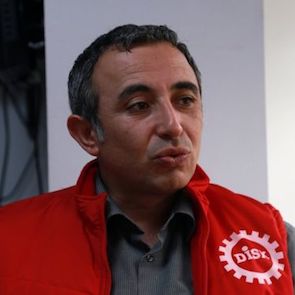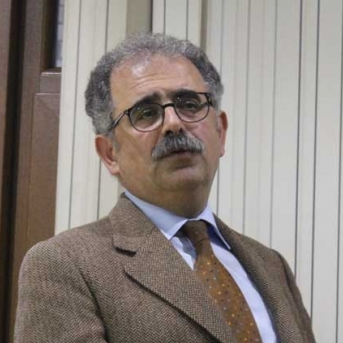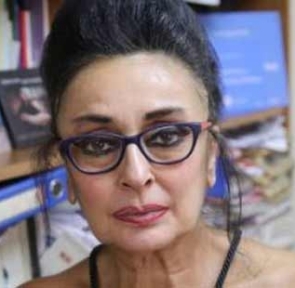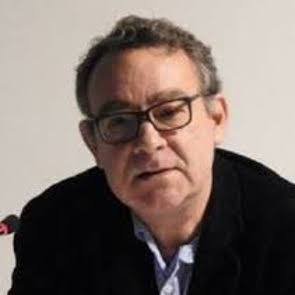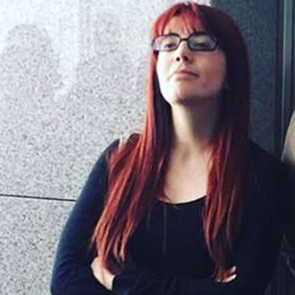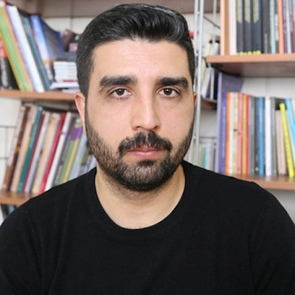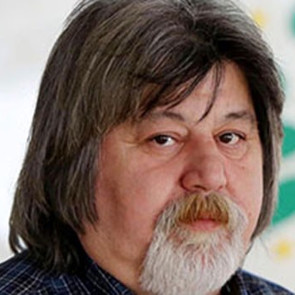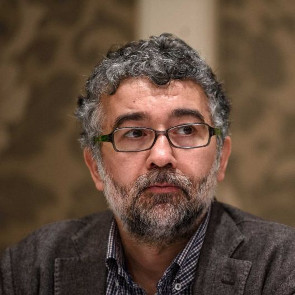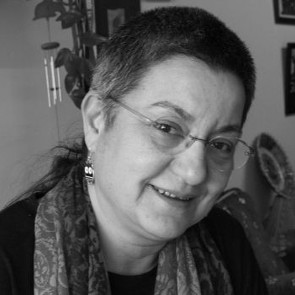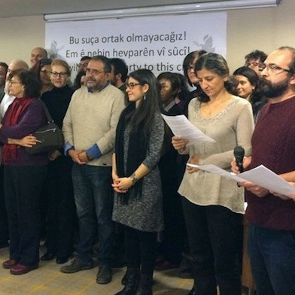UPR Submission - Turkey 2019
Submission to the 35th Session of the Univeral Periodic Review, January 2020
Date Submitted: 17 July 2019
Introduction
The following submission has been prepared by Front Line Defenders, ISHR, Truth Justice Memory Center, Kaos GL, Netherlands Helsinki Committee and Association for Monitoring Equal Rights. It encourages States to consult UPR submissions by local human rights defenders and make recommendations to Turkey regarding the protection of human rights defenders (HRDs).
This submission is based on research carried out by the above organisations and information received from independent human rights defenders in Turkey. The submission covers the situation of human rights defenders in Turkey between 2015 and 2019.
I. DEVELOPMENTS SINCE PREVIOUS UPR CYCLE
1. In its 2015 UPR, Turkey accepted 2151 of 278 recommendations made by States. It accepted 29 recommendations specifically on the rights to freedom of opinion and expression and freedom of association and peaceful assembly. Turkey also supported three recommendations2 calling for it to ensure that the penal code and anti-terror laws are consistent with international obligations. Furthermore, it accepted one recommendation3 highlighting the need for an effective investigation into the murder of Hrant Dink, an Armenian journalist and human rights defender who was killed in January 2007. Turkey accepted two recommendations4 encouraging the state to further cooperate with civil society. It also accepted eight recommendations5 regarding the independence and impartiality of the judiciary and the right to fair trial, including pursuing its work on reforms with a view to ensuring the independence and impartiality of the judiciary; and continuing to take steps to strengthen the rule of law by ensuring the effective implementation of legal reforms.
2. Nevertheless, four years later, attacks on these freedoms persist through an intensified crackdown against all forms of peaceful dissent and unprecedented policies aiming to further restrict civic space. In the aftermath of the attempted coup in July 2016, the environment for the work of human rights defenders (HRDs) deteriorated as civil society was further repressed. In particular, through the wide- ranging use of State of Emergency laws and of legislation introduced immediately after the lifting of the State of Emergency, the Turkish government has significantly infringed on the rights to freedom of expression, the media, assembly, and association, and has particularly restricted the liberty of those engaged in human rights work while removing crucial safeguards protecting HRDs.
II. KEY TURNING POINTS
A) The collapse of the peace process and the implementation of curfews in the South-Eastern Turkey
3. Since 2015 there has been an escalation in fighting between Turkish security forces and Kurdistan Workers' Party (PKK) forces following the collapse of the peace process that started at the end of 2012. Following the collapse, the government began to criminalize HRDs working on the Kurdish issue via counter-terrorism policies. This was followed by anti-terror operations carried out by the government between August 2015 and August 2016, characterized by 111 officially confirmed, open-ended and round-the-clock curfews which were declared in at least 35 districts of nine cities in South-Eastern Turkey as a de facto emergency measure. According to data from Human Rights Foundation of Turkey, at least 1,500,000 people in the region were affected by these curfews. Numerous cases of excessive use of force; killings; enforced disappearances; torture; destruction of housing and cultural heritage; incitement to hatred; prevention of access to emergency medical care, food, water and livelihoods, and violence against women were reported.
4. During the curfews, HRDs were barred from entering the curfew areas to observe the situation or to document human rights violations. Furthermore, hundreds of journalists, local representatives, lawyers and HRDs were arrested and charged with terrorism related offences. Dozens of newspapers, online media outlets and several TV channels were suspended or blocked. These restrictions have had a serious negative effect on the freedom of HRDs working in the context of the Kurdish issue.
B) The Attempted Coup and the State of Emergency
5. During the State of Emergency which was introduced on 15 July 2016, 36 decrees were issued constraining certain civil and political rights, as well as the rights of defendants, while the powers of police and prosecutors were expanded. 150,348 people have been dismissed from their jobs,6 including trade unionists and HRDs, over 100,000 people have faced criminal investigations and potential prosecution, over 50,000 people have been imprisoned pending trial, 189 media outlets and over 1,300 associations and foundations have been shut down, 6,021 academics have lost their jobs, and 319 journalists and media workers have been detained or imprisoned. The State of Emergency measures provided the legal framework for an unprecedented wave of detentions and prosecutions, and the erosion of fair trial rights in Turkey.
6. The Constitutional Court has ruled that it does not have the mandate to review the legality of emergency decrees, while the parliament reviewed only 32 of the 36 decrees. In May 2017, the Inquiry Commission on the State of Emergency Measures was established to review all individual complaints in regard to the decrees. However “the lengthy review procedures, the lack of institutional independence, and the absence of a proper means of defence resulted in the failure to provide an effective recourse against dismissals so far”.7
7. The State of Emergency ended on 18 July 2018, when its last extension expired. However, this was immediately followed by the adoption of legislation that retained many elements of emergency rule for a further three years. The legislation contains many measures similar to the extraordinary powers the authorities enjoyed under emergency rule, such as widening already broad powers of appointed provincial governors to restrict assemblies and movement; executive authority to dismiss public officials; and increased police powers including custody periods extendable for up to 12 days. Therefore it should be noted that many of the measures introduced during the State of Emergency remain in force today, and continue to have a profound and devastating impact on HRDs.
C) The New Presidential System
8. The new presidential system, which was agreed in 2017 by a referendum and started to be implemented in June 2018, lacks sufficient checks and balances against abuse of executive power, and thus greatly diminishes the powers of parliament while consolidating presidential control over most judicial appointments. The first elections under the new system took place in June 2018, under the State of Emergency and in a climate of media censorship and repression of HRDs, when many journalists, HRDs, parliamentarians and even the presidential candidate from the pro-Kurdish opposition were in jail. The new presidential system has had a negative impact on civil society engagement and HRDs’ communication with the authorities.
III. RISKS AND ATTACKS FACING HUMAN RIGHTS DEFENDERS
9. The space for civil society has dramatically shrunk and repression against HRDs has significantly increased since Turkey’s last review. HRDs, journalists, cultural workers, academics and anyone promoting and defending the rights of women and LGBTI+ people, the Kurdish community, religious and cultural minorities and workers undergo various forms of reprisal, discrimination, and attacks, including threats, intimidation, stigmatization, judicial harassment, prolonged arbitrary detention and travel bans.
10. All of these restrictions imposed on the activities of HRDs and the general climate of fear has led to self-censorship of HRDs, discouraged others from becoming involved in human rights organisations and bolstered the perception that the authorities are suspicious of and hostile towards them.
A) Stigmatization and Vilification of HRDs
11. Public vilification of HRDs, including the use of inflammatory rhetoric and smear campaigns, has intensified drastically, with the aim of intimidating them, delegitimizing and undermining their human rights work and affecting their credibility. These methods have also been deployed to weaken public support they enjoy and thereby provoke less of a reaction when authorities move against them.
12. HRDs are very often publicly labelled as “terrorist”, “traitors”, “unpatriotic”, “foreign agents” or "internal enemies", “perverts” and accused of opposing national or moral values. Such statement were made by high-profile government representatives, pro-government media as well as state-sponsored anonymous Internet political commentators and trolls. While social media platforms often refuse or are too slow to take down such content, in the absence of independent media8 the mainstream media conglomerates are quick to amplify smear campaigns against HRDs and further disseminate the hostile rhetoric against them.
13. Following the publication of their statement drawing attention to the negative effects of war on public health after the military operation in Afrin, executive members of Turkish Medical Association (TTB) were threatened with physical violence and labelled as “traitors” on social media. The President also publicly called them as “terrorist lovers”. This was followed by the judicial harassment against the eleven council members who were sentenced to prison on the charge of "provoking the public to hatred and enmity" on 3 May 2019.
14. A similar campaign was carried out against the Academics for Peace, who signed a declaration in January 2016 condemning the security operations in the south-east and calling for a resumption of the peace talks. President Erdogan publicly described the academics as “fifth columns of foreign powers undermining Turkey” and “dark forces” on 12 January 2016. These smears were repeated many times by other government representatives and shortly afterwards the pro-government daily Yeni Akit published the names of all the signatories and further labelled them ”traitors” and “lovers of Armenians”.9 Sedat Peker, a pro-government public figure, stated that he would "make them bleed and bathe in their blood" in a written statement posted on his website.10 Pro-government columnist Cem Küçük wrote that “they should be fired from the institutions where they are employed and their public existence become de facto nullified”.11 This was followed by further intimidation and judicial harassment against the academics.
15. LGBTI+ rights defenders, systematically marginalized, are also frequently stigmatized. They are often branded “perverts”, “family wreckers”, “sexually promiscuous deviants” or ”anti-religious blasphemers” and accused of promoting foreign cultures and breaking up families. In the pro-government media, LGBTI+ rights organisations are often represented as “organisations founded by foreign foundations in order to lead the youth to perversion and deviance and to damage the Turkish family structure by destroying the national and moral values of Turkish nation.” Hostile rhetoric against LGBTI+ defenders is used not only by pro-government media and extremist groups but also by government officials12 and even by public authorities working at national human rights institutions. One recent example from 2018 is the homophobic social media post made by a member of Turkish Human Rights and Equality Institution (TIHEK) who wrote: “What pride, what love? Love happens between two different sexes. Both the divine creation and nature says this. This is a regression. It’s regressing back from nature towards savagery”, as a comment under Amnesty International’s tweet about Istanbul Pride Walk in 2018.13 Furthermore, on 29 April 2019 at a conference entitled “International Symposium on the Right to Protect Family” organized by TIHEK, one of the speakers said “Indecencies like [being] LGBT are attempts to undermine humankind, its nature and family. I believe that the church and the synagogue would stand against these indecencies as well, and we should struggle against it together if necessary”. TİHEK also shared these statements on its social media accounts.14
16. Women HRDs face similar stigmatization when defending their rights. On 8 March 2019 the annual Women’s March was broken up by police who used tear gas and pepper spray to disperse the demonstrators. The President subsequently accused the protestors of chanting while a nearby mosque was reciting the adhan (call to prayer). Following this statement the Interior Minister added: "You have seen their banners (carried by participants during the women’s march), they are all disgusting! (...) Our friends are doing the necessary investigations about this.” In the following days, many pro-government media outlets covered the President's remarks in their headlines, calling the Feminist March and the opposition parties "the enemies of the flag and adhan". The organizers of the Feminist March issued a statement saying that the chanting and whistling was part of the protest against police violence and was not aimed at the call to prayer. On 10 March 2019, a group of Islamists gathered in Taksim, threatening the feminists and shouting slogans such as "Break the hands that target adhan".
B) Threats, Intimidation and Physical Attacks Against HRDs
17. The targeting of HRDs with smear campaigns is often a precursor for more direct threats, intimidation, and in extreme cases, violent attacks against them. However there is extremely limited protection available to HRDs and rights-based organisations when they receive threats, while there is little genuine effort to hold the perpetrators accountable.
18. The president of the Diyarbakır Bar Association and human rights lawyer Tahir Elçi received many death threats after his statements in regard to the Kurdish issue15 on a TV programme on 14 October 2015. He was labelled as a “terrorist”, detained and faced charges of “propagandising for a terrorist organisation”. He was killed in an attack on 28 November 2015 when he was caught in a street shoot-out between plain clothes Turkish police officers and suspected PKK-affiliated armed youth in the Sur district of Diyarbakır. Just before his killing, he had held a press conference, at which he decried the arrival of the conflict to the city and the destruction of its cultural heritage, and called for an immediate end to the armed clashes. Nearly four years after his death, no one has been held accountable for his murder.
19. LGBTI+ rights organisations are continuously targeted by pro-government media and by extremist groups, yet receive no protection from the authorities. In April 2016 Kaos GL, one of the largest Turkish LGBTI+ organizations had to temporarily close its Ankara office because of concerns about a potential attack by ISIS after the appearance on social media of internal correspondence of Turkish Military Intelligence listing all organisations at risk of an ISIS attack. Although Kaos GL officially contacted the relevant police department, no security measures were taken to protect the organisation.16 Furthermore, prosecutors frequently decline to investigate threats and hate speech against LGBTI+ organisations. If a case is opened, the courts typically issue a verdict of acquittal. One example from February 2019 is the decision of acquittal issued by a court for the charge of “provoking the public to hatred and enmity” against the editor-in-chief of the website “islamianaliz.com”, which described participants in the 2017 Mersin Pride Week as “dishonourable”, “perverts” and “villainous”.
20. HRDs working to protect the environment also face extensive threats, intimidation and violent attacks. They are generally less connected and experience greater difficulty in gaining visibility when they are attacked. In 2017, well known environmentalists Aysin and Ali Ulvi Büyüknohutçu were murdered following years of struggle against the operation of local stone quarries in Finike and other parts of Antalya province. They were found dead in their home on 10 May 2017. A 31-year-old suspect, Ali Yumaç, was quickly arrested and a couple of months later he confessed in a letter sent to his relatives that an individual linked to a stone quarry, one of many in the region that the couple was fighting against, had hired him to commit the murder. However, he denied that he was hired in his second statement and he allegedly committed suicide in prison, while awaiting trial in the summer of 2017.17
C) Judicial Harassment Against HRDs and Criminalisation of Human Rights Work
21. The activities of HRDs have been restricted through a large number of laws and regulations which are not aligned with international human rights standards, particularly anti-terror laws, public order legislation, laws on associations and foundations, Internet law, and press laws. No meaningful reforms of the legal framework to fully guarantee the exercise of freedom of expression in the media and internet have taken place since the previous UPR cycle.
22. In particular, the State of Emergency and the legislation introduced following the lifting of the State of Emergency have paved the way for excessive and abusive use of certain laws, such as anti-terrorism laws and laws on assemblies and demonstrations, to detain and prosecute HRDs and other critical voices in society. It should also be noted that many of the measures introduced during the State of Emergency remain in force today, thanks to the legislation introduced just after the lifting of the State of Emergency that removed crucial safeguards protecting HRDs.
23. A huge number of investigations and trials opened against HRDs in recent years involve fabricated charges of “propagandising for a terrorist organisation”, “being a member of a terrorist organisation”, “insulting the President”, “denigration of Turkishness”, “incitement to enmity and hatred” and "revealing state secrets". Such cases often end with prison sentences, and rarely with suspended sentences or punitive fines, which also have a serious deterrent effect on human rights work, and are designed as a new form of judicial harassment to intimidate HRDs.
24. In addition, the judiciary seems to be subjected to increasing political interference and is being used as a tool to suppress critical voices and to intimidate HRDs. The purge of the judiciary and the prosecutions of lawyers during the State of Emergency have had a significant negative effect on the independence and overall quality and efficiency of the judiciary.18 This has seriously undermined the ability of the criminal justice system to deliver fair and impartial trials, and led to HRDs suffering further violations of rights to liberty, to a fair trial, to free movement. Many HRDs face prolonged arbitrary detention and are subjected to travel bans.
25. For example, on 10 October 2018 the Istanbul 23rd High Criminal Court ruled to lift the international travel ban imposed on Eren Keskin. However, the international travel bans issued against her by other courts and related to other cases remained valid. As a consequence, the HRD was unable to attend the Martin Ennals Award for Human Rights Defenders ceremony held on 13 February 2019 in Geneva. To date, 143 lawsuits have been filed against Eren Keskin, some of which have been merged by the courts. She was also ordered to pay a cumulative fine of 72.000 TRY (about €10,900), while an additional fine of 460.000 TRY (nearly €70,000) remains under review by the Court of Appeals and the Supreme Court.
26. As of December 2018, the total number of people in prison without indictment or pending trial was 57,000, more than 20% of the prison population. In many cases, HRDs are convicted following procedurally flawed hearings without any material evidence.
27. The group of HRDs known as the Istanbul 10 were arrested on 5 July 2017 while attending a human rights workshop on digital security in Büyükada, an island close to Istanbul. Eight of them were kept in pre-trial detention for over a hundred days. Although all HRDs were released, their trials remain ongoing. Taner Kılıç, an executive from Amnesty International Turkey is facing between 7.5 and 15 years in prison on the charge of "being a member of an armed terrorist Organization", and the other HRDs are facing from five to 10 years in prison on the charge of "aiding an armed terrorist organization".
28. Fifty-six HRDs, journalists, artists, and writers who participated in the “Editors-in-Chief on Watch” solidarity campaign with the closed pro-Kurdish Özgür Gündem newspaper from 3 May to 7 August 2016, were subjected to judicial harassment. Thirty-six of them were charged with "propagandizing for a terrorist organization" and "publishing and spreading statements of terrorist organizations”. While most received suspended sentences and fines, Murat Çelikkan and Ayşe Düzkan were sentenced to 18 months’ imprisonment without suspension. Erol Önderoğlu, Ahmet Nesin and Şebnem Korur Fincancı were arrested on the same grounds in June 2016 and released after 10 days. The final hearing of their case was expected to happen on 17 July 2019.
29. On 4 March 2019 sixteen HRDs were indicted on charges of financing and organizing the 2013 Gezi protests, which saw the participation of almost three million citizens. The defendants, who are mostly civil society workers, face a possible life sentence without parole, on the charge of “attempting to overthrow the government wholly or partially preventing its functioning” without any concrete evidence. Evidence mentioned in the indictment includes “bringing professional protestors, trainers and facilitators from abroad to focus on issues like civil disobedience and peaceful protesting in order to keep the Gezi Park Protests ongoing” and “meeting with Western organisations and individuals to ban the sale of tear gas to Turkey”. Among the defendants, Osman Kavala, chairperson of Anadolu Kültür, and Yiğit Aksakoğlu have been arbitrarily detained in Silivri prison since November 2017 and November 2018, respectively. The first hearing of the case was held on 24 June 2019. While the Court ruled that Yiğit Aksakoğlu be released on probation with an international travel ban, Osman Kavala remains in detention.
30. As of 16 July 2019, 549 members of Academics for Peace have been dismissed from their jobs either directly by their universities or by emergency decrees issued during the State of Emergency, while many others were forced to resign or retire. This has resulted in what has been described as “civil death”; not only were they dismissed from their jobs, they also had their passports cancelled.19 To this date many HRDs remain banned from travelling in the absence of a court’s decision, based on the results of “confidential security investigations” carried out by police. Since the petition was launched, nearly 70 academics have been taken into custody, while four, who gave a press statement to inform the public about the unjust treatment of Academics for Peace, were kept in detention for more than two months. Currently, 784 academics are facing judicial harassment and the threat of imprisonment. 204 have been sentenced on charges of disseminating “terrorist propaganda”. The pronouncement of judgements has been delayed in 164 cases. 36 academics have received prison sentences, suspended only in four cases. One of them, Zübeyde Füsun Üstel, began her jail term on 8 May 2019. The legal proceedings concerning 580 academics remain ongoing.
31. Bülent Şık is a HRD working on public health, food safety and the right to a healthy environment, conducting research on areas such as toxic chemicals in food and drinking water and their impact on public health. He was an academic and Technical Assistant Director of the Food Safety and Agricultural Research Center at Akdeniz University. He is charged with “disclosing work secrets” and “providing and disclosing forbidden information” in relation to four articles that he published in the newspaper Cumhuriyet in April 2018. The articles reported on the findings of a Ministry of Health-led research study, conducted in conjunction with Akdeniz University, concerning public health. He is facing a prison sentence of between five and twelve years.
32. Academic and HRD Onur Hamzaoğlu was accused of "terrorist propaganda" and “provoking the people to hatred and enmity” as a result of issuing a joint press release opposing Turkey's military operations in Afrin in Syria. He was arrested on 9 February 2018, and released after five months pre- trial detention, following a court hearing on 19 July 2018.
33. Judicial harassment against HRDs is frequently prolonged over a number of years. For example, Nurcan Baysal who is a Kurdish HRD and journalist from Diyarbakır and the winner of the 2018 Front Line Defenders Award for Human Rights Defenders at Risk, was found guilty of demeaning the Turkish security forces on the basis of an article that she wrote in 2016 criticising the Turkish military operation in Cizre. She was sentenced to a 10 month jail term in 20 February 2018 and released on the condition that she would not repeat the offence within five years. On 22 January 2018, she was taken into custody again, at the Anti-Terror Branch, for three days and released after questioning. She faced up to three years in prison on a charge of “inciting people to hatred and enmity” for her anti-war tweets about Turkey’s military offensive in Afrin, Syria, based on the Article 216 of the Turkish Penal Code. She was acquitted on 21 February 2019, however she was again taken into police custody following a police raid at her house on the morning of 3 June 2019, on the grounds that there had been an arrest warrant issued against her in relation to the charge of "membership of an armed terrorist organisation". She was released later the same day, after submitting a deposition before a judge. The investigation was eventually closed on 17 June 2019.
34. The ability of defence lawyers to exercise their role has been curtailed. In flagrant violation of standards related to the legal profession, lawyers who take up the cases of HRDs charged with terror- related offences have themselves been labelled as “terrorists” and “traitors”. Many human rights lawyers who provide legal assistance to HRDs are at risk of arrest, detention and prosecution. One example occurred in September 2018 when 18 human rights lawyers from People’s Law Office were arrested. They were convicted on terrorism-related charges and sentenced to between three and 18 years in prison following procedurally flawed hearings.
35. Additionally, lawyers face reprisals in retaliation for their engagement with international and regional human rights mechanisms. One example is the arrest of a young Kurdish lawyer Ramazan Demir from Lawyers for Freedom Association (ÖHD) who was preparing a request for interim measures to the European Court of Human Rights during the latest curfews in the South-eastern Turkey. He was accused by the public prosecutor, of ‘denigrating Turkey because of complaints he filed before the European Court of Human Rights and the contacts he had with foreign lawyers’,20 and released on 7 September 2016 after five months in pre-trial detention.
D) Laws and Practices Restricting Advocacy and Freedom of Association
36. A number of rights-based civil society organisations were shut down under the State of Emergency. They have been unable to effectively challenge the decisions in administrative courts and not been offered any legal remedy in respect to confiscations of property.21 As a result, many human rights groups try to carry out their work without legal status. Among those shut down are Turkey’s leading child rights NGO, Gündem Çocuk; eleven women’s rights organizations; lawyers’ organizations such as the Progressive Lawyers’ Association (ÇHD) and Lawyers for Freedom Association (ÖHD); and organizations providing humanitarian support to displaced people and refugees.
37. Rights-based civil society organisations also face various forms of administrative obstacles, while pro-government organisations continue to gain a more visible role and opportunities for representation. For example, since October 2018, following an amendment to the Parliament's rules of procedure, civil society organisations are excluded from the legislative consultation process at parliamentary committees. A new regulation was also adopted recently obliging associations to disclose all of their members to the authorities.22
38. The capacity of civil society organisations to access international funding has effectively been restricted. Those in receipt of international funds have been subjected to extensive financial investigations and labelled as “branches of dark foreign forces with secret agendas”. For example, although there is no judicial decision against or investigation into Open Society Foundation (OSF), following the vilification of all civil society organisations receiving grants from the foundation, OSF shut down their offices in Turkey. Furthermore, the OSF Turkey director and some executive board members facing life imprisonment in the Gezi trial.
E) Laws and Practices Restricting Freedom of Peaceful Assembly
39. Many events, public meetings and demonstrations organized by HRDs have been prohibited on security grounds, and those that have taken place have resulted in forceful dispersal by police, often with mass detentions and prosecution of participants. Police officers also record and photograph those attending in order to intimidate participants and to create a “blacklist”. It also reinforces the belief that the authorities regard activities in defence of human rights as suspect and potentially criminal, which discourages others from becoming involved in such activities.
40. Even though freedom of assembly is guaranteed in the constitution in line with international human rights standards, secondary legislation, including Law No 2911 on Meetings and Demonstrations and Law No. 3713 on The Prevention of Terrorism Acts, establish severe limitations. The conditions foreseen for banning, postponing or terminating a meeting or demonstration are drafted in a very vague manner which allow for the abuse of the legislation. Under the State of Emergency, governors in several provinces used wide-ranging State of Emergency powers to ban events and assemblies. Legislation introduced immediately after the lifting of the State of Emergency also provided many measures similar to extraordinary powers, including widening the powers of appointed provincial governors to prevent people from entering or leaving certain locations in their provinces for up to 15 days, and to prevent all movement or assemblies at particular locations or times on security grounds.
41. In November 2017, under the State of Emergency, a blanket indefinite ban on all public events focused on LGBTI+ issues was issued by the Ankara Governorship. Despite the end of emergency rule in July 2018, the Ankara governor’s office did not lift the ban. On the contrary, on 3 October 2018, the governor’s office informed law enforcement and other relevant authorities about a new ban, without giving any indication of when it would end. On 19 April 2019, an Ankara administrative Appeals Court lifted the ban introduced under the State of Emergency, on the grounds that it was unlawful and restricted rights and freedoms in unconditional, vague, and disproportionate ways. Although the legal proceedings against the second ban remain ongoing, the court’s decision to lift the ban imposed under the State of Emergency shows that the new ban issued on the same grounds is also manifestly unlawful. However many public events related to LGBTI+ issues are still being banned on the same grounds, based on the second ban, including, for example, the ban on METU Pride March, and on a panel being organized by Pink Life Association. LGBTI+ Pride parades, trans parades and marches organized on the International Day Against Homophobia, Transphobia and Biphobia have already been banned and stopped by police in Istanbul and in many other provinces, for the last five years on vague security, public order, public health, and public sensitivity grounds. Attempts to carry out such marches often resulted in detentions and prosecution of the participants.
42. On 25 August 2018 police forcefully dispersed the Saturday Mothers, a collective of relatives of people disappeared decades before, who have been protesting on a weekly basis to demand accountability. Saturday Mothers were to hold their 700th vigil when the march was dispersed. The police used tear gas to stop the protest and arrested 47 people – some of them in their 80s. Since then the weekly vigils have not been permitted in the public square they were usually held.
43. On 14 September 2018, approximately 10.000 construction workers ceased operations and organized a peaceful protest to demand improvement of the poor working and living conditions on the construction site of Istanbul’s third airport. On the night of the protest, the gendarme raided the dormitories of the workers and detained 401 workers. While the majority of the detained workers were released in the following days, 28 workers and trade unionists were arrested. Over the next days, six more workers/trade unionist were detained, including Özgür Karabulut, the head of Progressive Construction Workers Union (Dev Yapı-İş). They were all released in a week but the criminal case against 61 construction workers and trade unionists remain ongoing. They are facing charges of “disrupting the freedom to work”, “damaging public property”, “resisting police” and “possessing weapons during public assemblies and demonstrations”.
III. RECOMMENDATIONS
44. Front Line Defenders, ISHR, Truth Justice Memory Center, Kaos GL, Netherlands Helsinki Committee and Association for Monitoring Equal Rights call upon States to urge the government of Turkey to prioritise the protection of HRDs and in doing so:
- Refrain from using language that vilifies HRDs and take steps to address the climate of fear and intimidation by positively and publicly recognizing the important role of HRDs and the legitimacy of their work;
- Immediately and unconditionally release HRDs and other civil society actors who have been detained and prosecuted as a result of their legitimate human rights work;
- Reinstate the necessary conditions to ensure the independence, impartiality, accountability, quality, efficiency and professionalism of the judiciary and national human rights institutions;
- Ensure that any allegation of wrongdoing or crime committed by HRDs is subject to due process, based on evidence and fully transparent procedures, and fully respecting relevant procedural rights, in particular the presumption of innocence, individual criminal responsibility, legal certainty, the right to defence, the right to a fair trial, equality of arms and the right to an effective appeal;
- Ensure that existing legislation – in particular the Anti-Terror Law, the Criminal Code and the Internet Law, Law on Assemblies and Demonstrations, and the Law on Provincial Administration – is revised to comply with international standards and is implemented in a manner which does not curtail freedom of expression and ensures proportionality and equality before the law;
- Ensure that criminal law provisions, in particular terror related crimes and articles on “insulting the President” and “degrading the Turkishness”, are not used as a means of putting pressure on critical voices;
- Ensure a more safe and enabling environment for women HRDs to defend their rights free from fear, threats, harassment and violence, including sexual harassment; acknowledge the important and legitimate role of women HRDs in the promotion and protection of human rights, democracy, and the rule of law; and reiterate the rights of women HRDs and condemn violence and discrimination against them;
- Ensure the provisions of “public order”, “public health”, “public moral” are not used against LGBTI+ rights defenders in a manner that violates their right to assembly and association; acknowledge the important and legitimate role of LGBTI+ defenders in the promotion and protection of human rights, democracy, and the rule of law; and reiterate the rights of LGBTI+ defenders and condemn violence and discrimination against them;
- Ensure threats, intimidation and violent attacks against HRDs are investigated and those responsible are brought to justice in line with international law and standards;
- Ensure that all HRDs arbitrarily dismissed during the State of Emergency are appropriately compensated for any harm; that human rights organizations arbitrarily closed down under the state of emergency have their legal status reinstated and their confiscated assets restored;
- Ensure the effectiveness of the Inquiry Commission on the State of Emergency Measures as a domestic remedy.
________________
1 Accepted: 157 - Already implemented or in the process of implementation: 58
2 150.22. Reform the law on counter terrorism in order to prevent imprisonment of journalists (France); 150.52. Exercise restraint using anti-terrorism legislation in legal procedures against journalists and to ensure the proportionality of measures that limit access to the internet (Netherlands); 148.117. Strengthen protection of the freedom of expression by allowing discourse and greater access to information, both online and offline, and ensure the penal code and anti-terror laws are consistent with international obligations (United States of America).
3 149.27. Conduct effective investigation on the case of murder of Hrant Dink, Editor-in Chief of the Turkish language Armenian weekly “Agos” (Armenia)
4 148.128. Ensure that civil society actors, including marginalized groups like those representing LGBT persons, are included in the implementation and follow-up of human rights obligations, including UPR recommendations (Norway); 149.43. Take into consideration the views of the civil society and respect EU standards when elaborating the security law package (France).
5 148.105. Pursue its work on reforms with a view to ensure the independence and impartiality of the judiciary and provide judges with adequate human rights training (Slovakia); 148.107. Continue to take steps to strengthen the rule of law by ensuring the effective implementation of legal reforms (Singapore); 149.22. Guarantee full independence of the judiciary (Luxembourg);149.23. All areas of the judiciary be completely independent from the executive (Denmark); 149.24. Protect the judiciary against all interference from bodies belonging to other branches of government (Switzerland); 149.25. Take steps to ensure the total independence and impartiality of the judiciary (Namibia); 149.26. Ensure the independenceand impartiality of the judiciary (Uruguay); 149.28. Address concerns about increasing interference by the executive in the judiciary (Australia); 149.29. Guarantee an independent and impartial judiciary, including by refraining from undue interference by the executive (Austria).
6 This number includes state officials, teachers, bureaucrats, and academics who were dismissed by government decrees. See ‘Turkey Purge’, available at: https://turkeypurge.com/
7 European Commission, Turkey Report 2019, p.28. Available at: https://ec.europa.eu/neighbourhood-enlargement/sites/near/ files/20190529-turkey-report.pdf
8 European Commission, Turkey Report 2019, p.33. Available at: https://ec.europa.eu/neighbourhood-enlargement/sites/near/ files/20190529-turkey-report.pdf
9 Sezin Öney, “Turkey’s academic petition affair: How Erdoğan’s attacks on critical academics are likely to bolster his support”. Available at: https://blogs.lse.ac.uk/europpblog/2016/01/21/erdogans-repression-of-cri... aimed-at-attracting-votes-from-the-far-right/
10 Sezin Öney, “Turkey’s academic petition affair: How Erdoğan’s attacks on critical academics are likely to bolster his support”. Available at: https://blogs.lse.ac.uk/europpblog/2016/01/21/erdogans-repression-of-cri... aimed-at-attracting-votes-from-the-far-right/
11 Sezin Öney, “Turkey’s academic petition affair: How Erdoğan’s attacks on critical academics are likely to bolster his support”. Available at: https://blogs.lse.ac.uk/europpblog/2016/01/21/erdogans-repression-of-cri... aimed-at-attracting-votes-from-the-far-right/
12 See for example: http://bianet.org/bianet/siyaset/164866-erdogan-biz-escinsel-aday-goster... and https://m.bianet.org/bianet/siyaset/184438-hdp-li-sancar-dan-bakan-soylu...
13 For further information: http://kaosgl.org/page.php?id=28210 and http://kaosgl.org/page.php?id=28227
14 For further information: http://kaosgl.org/page.php?id=28210 and http://kaosgl.org/page.php?id=28227
15 He stated on a TV show when talking about the peace process that the Kurdistan Workers' Party (PKK) should not be regarded as a terrorist organization but as an armed political organisation, despite the fact that some of its attacks can be considered as “terrorist attacks”.
16 “Turkish LGBT Organisation Closes Offices Amid Security Concerns”, ERA – LGBTI Equal Rights Association for Western Balkans and Turkey, 12 April 2016. Available at: https://www.lgbt12 Aprili-era.org/blog/turkish-lgbt-organization-closes-offices- amid-security-concerns
17 For further information: https://hrdmemorial.org/hrdrecord/aysin-buyuknohutcu/ and https://tr.boell.org/de/2017/05/22/enviromentalism-dangerous-thing-turkey
18 “Weathering the Storm, Defending human rights in Turkey’s climate of fear”, Amnesty International, p.5. Available at: https://www.amnesty.org/download/Documents/EUR4482002018ENGLISH.PDF
19 “Cancellation of Turkish Passports and Prevention of the Freedom of Movement”, Platform for Peace & Justice, 2018. Available at: http://www.platformpj.org/wp-content/uploads/Cancellation-of-Turkish-Pas...
20 “Turkey: Conditional release of Ramazan Demir and Ayşe Acinikli, members of the Association of Lawyers for Freedom (ÖHD)”, World Organisation Against Torture (OMCT), 2016.
21 “Weathering the Storm, Defending human rights in Turkey’s climate of fear”, Amnesty International, p.13. Available at: https://www.amnesty.org/download/Documents/EUR4482002018ENGLISH.PDF
22 European Commission, Turkey Report 2019, p.36. Available at: https://ec.europa.eu/neighbourhood-enlargement/sites/near/files/20190529...
